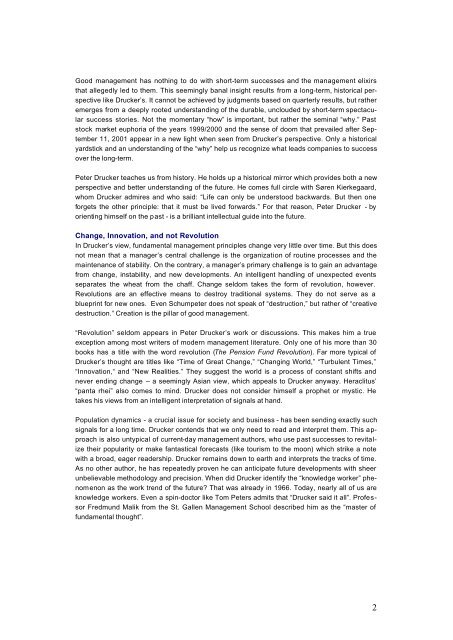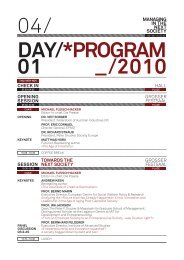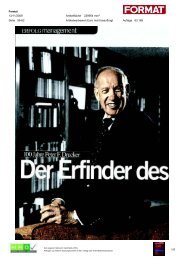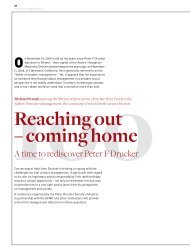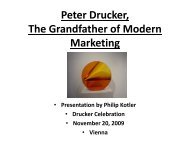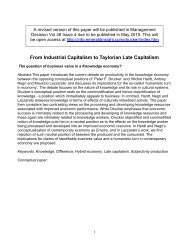Management - beyond the day - Peter Drucker Society of Austria
Management - beyond the day - Peter Drucker Society of Austria
Management - beyond the day - Peter Drucker Society of Austria
You also want an ePaper? Increase the reach of your titles
YUMPU automatically turns print PDFs into web optimized ePapers that Google loves.
Good management has nothing to do with short-term successes and <strong>the</strong> management elixirs<br />
that allegedly led to <strong>the</strong>m. This seemingly banal insight results from a long-term, historical perspective<br />
like <strong>Drucker</strong>’s. It cannot be achieved by judgments based on quarterly results, but ra<strong>the</strong>r<br />
emerges from a deeply rooted understanding <strong>of</strong> <strong>the</strong> durable, unclouded by short-term spectacular<br />
success stories. Not <strong>the</strong> momentary “how” is important, but ra<strong>the</strong>r <strong>the</strong> seminal “why.” Past<br />
stock market euphoria <strong>of</strong> <strong>the</strong> years 1999/2000 and <strong>the</strong> sense <strong>of</strong> doom that prevailed after September<br />
11, 2001 appear in a new light when seen from <strong>Drucker</strong>’s perspective. Only a historical<br />
yardstick and an understanding <strong>of</strong> <strong>the</strong> “why” help us recognize what leads companies to success<br />
over <strong>the</strong> long-term.<br />
<strong>Peter</strong> <strong>Drucker</strong> teaches us from history. He holds up a historical mirror which provides both a new<br />
perspective and better understanding <strong>of</strong> <strong>the</strong> future. He comes full circle with Søren Kierkegaard,<br />
whom <strong>Drucker</strong> admires and who said: “Life can only be understood backwards. But <strong>the</strong>n one<br />
forgets <strong>the</strong> o<strong>the</strong>r principle: that it must be lived forwards.” For that reason, <strong>Peter</strong> <strong>Drucker</strong> - by<br />
orienting himself on <strong>the</strong> past - is a brilliant intellectual guide into <strong>the</strong> future.<br />
Change, Innovation, and not Revolution<br />
In <strong>Drucker</strong>’s view, fundamental management principles change very little over time. But this does<br />
not mean that a manager’s central challenge is <strong>the</strong> organization <strong>of</strong> routine processes and <strong>the</strong><br />
maintenance <strong>of</strong> stability. On <strong>the</strong> contrary, a manager’s primary challenge is to gain an advantage<br />
from change, instability, and new developments. An intelligent handling <strong>of</strong> unexpected events<br />
separates <strong>the</strong> wheat from <strong>the</strong> chaff. Change seldom takes <strong>the</strong> form <strong>of</strong> revolution, however.<br />
Revolutions are an effective means to destroy traditional systems. They do not serve as a<br />
blueprint for new ones. Even Schumpeter does not speak <strong>of</strong> “destruction,” but ra<strong>the</strong>r <strong>of</strong> “creative<br />
destruction.” Creation is <strong>the</strong> pillar <strong>of</strong> good management.<br />
“Revolution” seldom appears in <strong>Peter</strong> <strong>Drucker</strong>’s work or discussions. This makes him a true<br />
exception among most writers <strong>of</strong> modern management literature. Only one <strong>of</strong> his more than 30<br />
books has a title with <strong>the</strong> word revolution (The Pension Fund Revolution). Far more typical <strong>of</strong><br />
<strong>Drucker</strong>’s thought are titles like “Time <strong>of</strong> Great Change,” “Changing World,” “Turbulent Times,”<br />
“Innovation,“ and “New Realities.” They suggest <strong>the</strong> world is a process <strong>of</strong> constant shifts and<br />
never ending change – a seemingly Asian view, which appeals to <strong>Drucker</strong> anyway. Heraclitus’<br />
“panta rhei” also comes to mind. <strong>Drucker</strong> does not consider himself a prophet or mystic. He<br />
takes his views from an intelligent interpretation <strong>of</strong> signals at hand.<br />
Population dynamics - a crucial issue for society and business - has been sending exactly such<br />
signals for a long time. <strong>Drucker</strong> contends that we only need to read and interpret <strong>the</strong>m. This approach<br />
is also untypical <strong>of</strong> current-<strong>day</strong> management authors, who use past successes to revitalize<br />
<strong>the</strong>ir popularity or make fantastical forecasts (like tourism to <strong>the</strong> moon) which strike a note<br />
with a broad, eager readership. <strong>Drucker</strong> remains down to earth and interprets <strong>the</strong> tracks <strong>of</strong> time.<br />
As no o<strong>the</strong>r author, he has repeatedly proven he can anticipate future developments with sheer<br />
unbelievable methodology and precision. When did <strong>Drucker</strong> identify <strong>the</strong> “knowledge worker” phenomenon<br />
as <strong>the</strong> work trend <strong>of</strong> <strong>the</strong> future That was already in 1966. To<strong>day</strong>, nearly all <strong>of</strong> us are<br />
knowledge workers. Even a spin-doctor like Tom <strong>Peter</strong>s admits that “<strong>Drucker</strong> said it all”. Pr<strong>of</strong>essor<br />
Fredmund Malik from <strong>the</strong> St. Gallen <strong>Management</strong> School described him as <strong>the</strong> “master <strong>of</strong><br />
fundamental thought”.<br />
2


